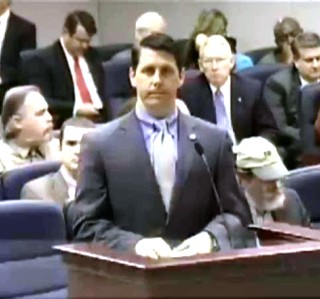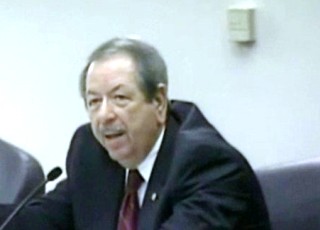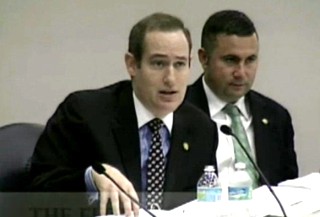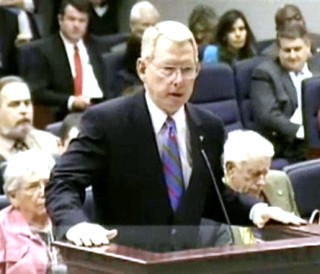|
An
Opinion By Jan Bergemann
President, Cyber Citizens For Justice, Inc.
Published
March 27, 2012
Looking
back at the legislative debate over HOUSE
BILL 319 two things stand out:
-
The
attempt of the proponents of the Safe Harbor provisions to make it
look like the amendments were just clarifying existing law.
-
The
claim of many legislators and proponents that there are many good
provisions in the bill that would really help associations.
Both
arguments in favor of H319 are fundamentally flawed!
You
may ask why is he still talking about this bill after it unceremoniously
died in the Florida Senate?
Easy explanation: The bill will be back next year, because the banks will
not rest until they get more concessions from the legislature to protect
themselves against liabilities caused by their own defective lending
practices that caused the whole financial disaster.
|
Representative
George Moraitis (R-District 91) made an attempt to make
his bill look favorable when explaining his bill to the
members of the Judiciary Committee.
Many
members of the Judiciary Committee agreed with him and
claimed that there are many good provisions in the
bill.
Representative
Charles McBurney (R-District
16), an attorney saying that he practices
"some" in the area, went out of his way to
praise the bill that contained provisions that are (his
words) "very favorable for associations."
I
contacted some of the legislators who claimed that there
are "association-friendly" provisions in
H319.
Guess
what? I either got no answer at all -- or just some
general statements. |
|
Rep.
George Moraitis (R-District 91)
Explanation
of H319
WATCH
THE VIDEO
|
No
matter how these explanations were phrased, under the line most of these
provisions wee seriously flawed, often caused by the wording created by
the "experts" who wrote the bill.
Make no mistake: In
my opinion not one of the provisions in the bill was really
association/owner friendly. Even the provisions that contained good
"intentions" were so miserably worded that they would have done
more harm than good!
Not
all members of the Judiciary Committee bought Moraitis's explanation.
Representative Ray Pilon (R-District 69), who has lived in homeowners'
associations and condominium associations, made that very clear when he
said: "I'm not convinced that to take one part that helps associations we are taking away the other side, some that will benefit."
|
Transcript
Rep. Ray Pilon:
"Well,
I'm not an attorney, I don't practice in this area, but I
am a member of a homeowners' and condominium association.
And the previous one where I lived had over 1200 units.
And right now, I'm not convinced that if you take one part
that helps those associations, we're taking away on the
other side some of their benefit. So I'm not happy with
the fact that we are giving something good in this bill --
I think there is a lot good in this bill -- and I'm not
satisfied with the debate going on what the other issue is
that we've talked about ad infinitum here.
So, I'm not
going to be able to support the bill today for maybe the
same reasons that some say |
|
Rep.
Ray Pilon (R-District 69)
WATCH
THE VIDEO
|
| they are going to support that want you to go forward
and try to work this out. But I have seen lines drawn in the sand.
You and I have talked -- I've been leaning and leaning, but I always want to make my decisions based on my
feelings and my conscience, on what this bill is going to do. If
you can not -- if these two sides can not get together with some
further compromise, I don't think we've got enough time and I'm
gonna end up on the floor hearing the same thing without any of
this coming to conclusion. So, only for that reason -- 'cause
there are a lot of great things in this bill that I like, but I
just can't in good conscience vote for your bill today -- and I
apologize for that to you." |
But
the real debate over the Safe Harbor amendments heated up in an exchange
between Representative Richard Steinberg (D-District 106) and bill sponsor
George Moraitis. Rep. Steinberg definitely asked questions that were never
properly answered. But the main question that was left unanswered: "Why are we letting the banks off the hook?"
|
Transcript: Rep.Steinberg/Rep.Moraitis:
Steinberg: "...if
associations had to incur legal fees -- uh, and I understand it's their
choice -- but if they were faced with the situation of we can either incur
legal fees and try to get title to the apartment while the bank is not
doing it, while the bank is stalling the foreclosure or we can just get
nothing and know that the banks are going to end up with the cap they have
in place. If they make the decision to take on litigation because the bank
is not moving diligently on the foreclosure, why should the bank be let
off the hook for having to incur that cost that some courts have determine
that they have to incur?"
Moraitis: "Again,
when the association decides to foreclose its assessment lien they are
doing it for
|
|
Rep.
Richard Steinberg (D-District 106)
WATCH
THE VIDEO
|
| their
own benefit. They are not doing it to rent the property and start
paying the bank's mortgage. They would be doing it ostensibly to
rent the unit and collect the rent themselves until the bank
finally gets around to foreclosing it. So, I wouldn't agree that
that would be relevant as to why the bank should either pay or
not." |
But the facts became really distorted when Michael
Fields, lobbyist for the Bank of America, took the podium. His
statement: "This is not a change in the law, this is a clarification of the statute that is been in place since
1992" is factually absolutely wrong.
Transcript
of Presentation by
Michael
Fields (Bank of America):
Good morning, Mr. Chairman, I will be very, very brief. This is not a change in the
law; this is a clarification of the statute that's been in place since 1992.
I
was part of the group that negotiated this part of the
Condominium Study Commission to, to, at that point, have
the lenders have two things: One, some responsibility to
the condominium association in terms of protection of
collateral; but two, to have certainty as to what their
risks are. Any
time you inject additional uncertainty as has come about
recently, you impact two things: You impact either the
availability of credit or the cost of that credit. And
that has a significant impact on values. I would ask that
you support the bill."
|
|
Michael
Fields (Lobbyist) - Proponent
Florida President, Bank of America
WATCH
THE VIDEO
|
Fields
may be correct when it comes to condominium law (FS718), but his statement
is absolutely wrong for homeowners' association law (FS720). Fields seems
to ignore the fact that until 2007 -- after the foreclosure crisis already
started -- there was NO Safe Harbor protection for banks in
the existing statutes regulating homeowners' associations. FS
720.3085
was only added to FS 720 in the 2007 legislative session by Senate
Bill 1844. Meaning,
it's definitely not long- established law. Some attorneys even question if
this law should be applied retroactively for mortgages that already
existed before the provisions of the bill went into effect on July 1,
2007. Isn't a contract a contract?
Hopefully,
next year cooler heads will prevail. We can only hope to see two bills
running through the legislature:
-
One
bill that deals with all the issues that HELP
ASSOCIATIONS/OWNERS deal with the daily problems our
communities are facing on a daily basis; with provisions that will
really help the still paying owners who are in financial distress
caused by foreclosures and lack of consumer protection.
-
One
bill that deals with the attempt to BAILOUT BANKERS.
That
would make it even more clear who is for -- and who is against --
community association members. No more hiding behind fancy talk!
Representative
Ray Pilon made it pretty clear: It makes no sense to have one bill that is
favorable for associations, but contains provisions that take away things
that help associations.
No matter
what, we all should always remember the question Representative Steinberg
asked bill sponsor Representative Moraitis: "If legal fees aren't
paid by the bank, wouldn't the end result be that the legal fees have to
be borne by the association and those who are paying the fees, those that
are not in foreclosure, but those that are being good citizens within the
association?"
That's
actually not really a question; that's actually a fact that nobody can
deny! Let's make no mistake: The two big law firms that supported the
Safe
Harbor
provisions -- Becker & Poliakoff (CALL) and Katzman
Garfinkel & Berger (CAN) -- are not the welfare office. They
would not waive their legal bills because the associations can no longer
collect them from banks and mortgage lenders.
Representative
Steinberg was 100% correct when he said that the burden of paying these
legal fees would be borne by the good citizens who are still paying their
association fees. And they are definitely the least guilty parties in this
foreclosure disaster caused by the same entities that some legislators
want to bail out, since they are counting on their campaign fund
contributions!
|



